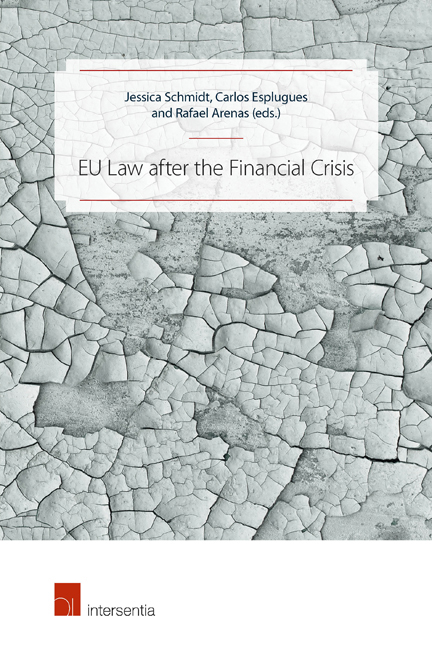Book contents
- Frontmatter
- Contents
- List of Abbreviations
- List of Authors
- Introduction
- PART I RESCUE MECHANISMS AND MONETARY POLICY
- PART II THE IMPACT OF THE FINANCIAL CRISIS ON THE BANKING SECTOR AND CAPITAL MARKETS
- PART III THE FINANCIAL CRISIS AND TAX LAW
- PART IV THE FINANCIAL CRISIS, CONSUMERS AND CONSUMER LAW
- PART V THE FINANCIAL CRISIS AND COMPETITION LAW
- PART VI THE FINANCIAL CRISIS, RESTRUCTURING AND INSOLVENCY LAW
- PART VII THE SOCIAL DIMENSION OF THE FINANCIAL CRISIS AND EU CITIZENSHIP
- PART VIII REFLECTIONS ON THE IMPACT OF THE FINANCIAL CRISIS ON THE GENERAL EUROPEAN LEGAL FRAMEWORK AND THE FUNDAMENTAL “EUROPEAN IDEA”
Introduction
Published online by Cambridge University Press: 13 December 2017
- Frontmatter
- Contents
- List of Abbreviations
- List of Authors
- Introduction
- PART I RESCUE MECHANISMS AND MONETARY POLICY
- PART II THE IMPACT OF THE FINANCIAL CRISIS ON THE BANKING SECTOR AND CAPITAL MARKETS
- PART III THE FINANCIAL CRISIS AND TAX LAW
- PART IV THE FINANCIAL CRISIS, CONSUMERS AND CONSUMER LAW
- PART V THE FINANCIAL CRISIS AND COMPETITION LAW
- PART VI THE FINANCIAL CRISIS, RESTRUCTURING AND INSOLVENCY LAW
- PART VII THE SOCIAL DIMENSION OF THE FINANCIAL CRISIS AND EU CITIZENSHIP
- PART VIII REFLECTIONS ON THE IMPACT OF THE FINANCIAL CRISIS ON THE GENERAL EUROPEAN LEGAL FRAMEWORK AND THE FUNDAMENTAL “EUROPEAN IDEA”
Summary
The financial crisis has literally tested − and still does test − the stress of the EU: it has laid bare many fundamental issues and conundrums of the EU and the EU legal system that had been waiting to be seriously addressed for quite a number of years.
In May 2015, the University of Bayreuth and AIPDIRI organised an international conference of academics and practitioners in Madrid which provided a unique opportunity to discuss the direct and indirect consequences of the financial crisis from various angles, focusing in particular on the position of Germany and Spain. The papers presented at this conference have been revised, expanded and compiled to form this book.
Generally, the financial crisis is first associated with the massive rescue measures undertaken by the ECB, the EU and Member States. Hence, it seems only logical to look at these first in Part I of this volume. Antonio Pastor Palomar thoroughly analyses the various Eurozone rescue mechanisms and in particular the interplay between EU law and international law in setting them up (pp. 5–23). Then Markus Roth takes a look at the consequences on monetary policy and pensions (pp. 25–29).
Part II is devoted to the area which has probably been affected hardest and in the most visible way by the financial crisis: the banking sector and capital markets. The contribution by Jessica Schmidt provides an overview of the most important reform measures in European company and capital markets law in the aftermath of the financial crisis and analyses their practical and conceptual ramifications (pp. 33–46). Against the background of the general goal of reducing systemic risk, Henrik Gildehaus then examines whether CoCo bonds may be a means to achieve this and their role within the new regulatory system (pp. 47–63). Finally, Matthias Lehmann investigates whether EU financial law has become overly complex (pp. 65–68).
A rather interesting, though oft en overlooked, issue is the interaction between the financial crisis and tax law; this is brought into focus in Part III. Agustín J. Menéndez's contribution addresses the financial crisis as a tax crisis (pp. 71–95). Subsequently, André Meyer explores whether we need a common European tax policy (pp. 97–106).
- Type
- Chapter
- Information
- EU Law after the Financial Crisis , pp. 1 - 2Publisher: IntersentiaPrint publication year: 2016



